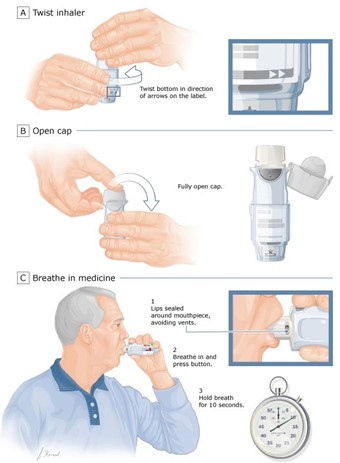A nurse is administering a client's morning oral medications.
Which of the following actions should the nurse take?
Verify the medication three times with the medication administration record.
Document medication administration prior to administering medication.
Administer time-critical medication 60 min before or after the scheduled time.
Identify the client by using one identifier before giving the medication.
The Correct Answer is A
a. Verify the medication three times with the medication administration record.
When administering oral medications, the nurse should verify the medication three times with the medication administration record to ensure that the correct medication is being given to the correct client at the correct time. This is known as the "three checks" and is an important step in preventing medication errors.

Nursing Test Bank
Naxlex Comprehensive Predictor Exams
Related Questions
Correct Answer is C
Explanation
Albuterol is a bronchodilator medication that is commonly delivered through a metered-dose inhaler (MDI) to treat asthma and other respiratory conditions. Proper inhaler technique is crucial for the effective delivery of the medication to the lungs.
Option (a) is incorrect because the client should actually tilt their head back slightly and breathe out fully before inhaling the medication.
Option (b) is incorrect because the client should take a slow, deep breath while depressing the canister once.
Option (d) is incorrect because the client should hold their breath for 10 seconds after inhaling the medication to allow it to reach the lungs.
Therefore, the correct instruction for the nurse to include in the teaching is to instruct the client to close their mouth around the mouthpiece of the inhaler to ensure that the medication is delivered directly to the lungs.

Correct Answer is A
Explanation
The correct answer is: a. Temperature 38.8° C (101.8° F)
Title: Choice A reason: A temperature of 38.8° C (101.8° F) is indicative of a fever, which is a common symptom of a hemolytic transfusion reaction. During such a reaction, the immune system attacks the transfused red blood cells, leading to their destruction and the release of substances that can cause a rise in body temperature.
Title: Choice B reason: Straw-colored urine is not typically associated with a hemolytic transfusion reaction. Hemolytic reactions often result in darker urine due to the presence of free hemoglobin released from destroyed red blood cells.
Title: Choice C reason: An apical pulse rate of 58/min is considered bradycardia if it is lower than the normal resting heart rate for adults, which ranges from 60 to 100 beats per minute. Bradycardia is not a direct indicator of a hemolytic transfusion reaction.
Title: Choice D reason: Elevated blood pressure, such as 158/92 mm Hg, can be a sign of various conditions but is not a specific indicator of a hemolytic transfusion reaction. The symptoms of such a reaction are more directly related to the destruction of red blood cells and the body’s response to it.
Whether you are a student looking to ace your exams or a practicing nurse seeking to enhance your expertise , our nursing education contents will empower you with the confidence and competence to make a difference in the lives of patients and become a respected leader in the healthcare field.
Visit Naxlex, invest in your future and unlock endless possibilities with our unparalleled nursing education contents today
Report Wrong Answer on the Current Question
Do you disagree with the answer? If yes, what is your expected answer? Explain.
Kindly be descriptive with the issue you are facing.
